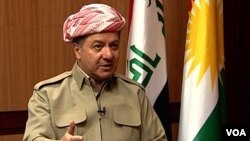As Iraq’s attempts at building a new government failed on Tuesday, Kurdish President Massoud Barzani said he would push for a referendum on independence for Kurdistan.
Barzani spoke with VOA's Persian service on Tuesday in Irbil, the largest city in the Kurdistan region of Iraq.
The Iraqi army has struggled against offensives by the Islamic State of Iraq and the Levant (ISIL), the Islamic militant group that has captured large sections of Iraq’s north and west.
When the Iraqi army abandoned the city of Kirkuk, Kurdish peshmerga stepped in to defend the city, as well as other northern towns deserted by Iraqi forces.
The Kurds are exerting control over a larger part of the region, which is behind an increased push for independence.
“This is a natural right that must be achieved,” Barzani said, adding that he hopes to conduct a referendum within months. “ I believe now the conditions are also favorable for independence. … Once achieved, we will help our brethren in Iraq, within our capabilities, to help Iraq maybe surmount the current crisis.
“But this does not mean that we will set aside the independence of Kurdistan,” he added. “A referendum in Kurdish areas will determine our ultimate decision. We will implement whatever the people decide.”
'A new Iraq'
As far as what the future holds for Iraq, Barzani said, “I doubt if Iraq will go back to what it was. Maybe only God knows what will happen.”
He said that in 2003, with the downfall of former Iraq President Saddam Hussein’s Baathist regime, the Kurds tried to help build “a new Iraq.”
An Iraq “in which everyone’s rights and duties were well defined … in order to build a democratic, federal, multi-party Iraq,” he said.
However, that didn’t happen, Barzani said.
“If a democratic, federal, Iraq would have taken shape, and Kurdish rights had not been violated, no one would have thought about independence,” he said.
The country today finds itself split along ethnic and secular lines, as witnessed Tuesday in Iraq’s parliament session, which ended quickly after Sunnis and Kurds walked out.
They complained that the Shi'ites had failed to nominate a prime minister, a condition they had set for revealing their nominees for speaker.
Respect for Kurds
Barzani said there are conditions that must be met before the Kurds will help in supporting the current Iraqi government.
“The Kurds did not bring about the dangerous situation (that threatens) the integrity of Iraq,” he said. “We have not partitioned Iraq, rather, it was others who brought about this catastrophe and broke up Iraq into pieces. And that is why those who created this situation must resolve it as well.“
Barzani said that for years, Kurds have been treated as “second- and third-class citizens. That is why, from now on, we will not accept such treatment," adding that this is another reason he is pushing for independence for the Kurdish people.
“So what should we do now? Did we create the current conditions in Iraq?” he asked. “We are not prepared to wait for an uncertain future anymore and continue burning in this fire. We will get out of the fire,” Barzani said, referring to the desire for a referendum.
Others in the region have nothing to fear from an independent Kurdistan, Barzani added.
“We have made clear that we pose no threat to Iran, Turkey or any other side,” he said, citing establishing relationships with these countries.
He said the Kurdish government has helped Iran and Turkey resolve Kurdish issues “in a peaceful, democratic manner. … We believe that Iran and Turkey have also accepted the fact that we are not a threat.”
Sale of oil
When the Kurdish Regional Government began selling oil under its control last month, Baghdad weighed in, calling it illegal. The KRG, which has exported more oil since then, maintains it is within their constitutional rights to sell the oil.
The sale of oil has created another point of contention between Irbil and Baghdad, but Barzani said the sale is an economic necessity.
Kirkuk oil had been exported to Turkey through a pipeline that passed south of Mosul, he said. Now ISIL controls the pipeline and “prior to that it had been blown up,” he added.
“If this crude oil is not exported via the pipeline in Kurdistan, it has no other way of being exported,” Barzani said. “The income from export of this oil will go to all whose budgets were not paid by Baghdad - Kirkuk dwellers, all Kurdish people, even the people of Mosul. This oil is not only for the Kurds. It is for all including the Arabs and Turkmens of Kirkuk.”
He added, “The sale of this oil is our right and the right of all people of this region.”
The money is necessary because, Barzani said, Baghdad has not funded the KRG for the past six months. And they have not funded the peshmerga, who are considered part of the Iraqi defense forces, for the past 10 years, he added.
Kurdistan's future
Barzani’s political plans for the Kurdistan region include guarding and defending all areas of the Kurdish region, “Kurd, Arab, Turkmen, Assyrian, Chaldean, all will be protected.”
“We will use our oil revenue to create better and more comfortable living conditions for our citizens. And until the achievement of an Independent Kurdish state, we will cooperate with all to try to find solutions to the current crisis in Iraq,” Barzani said.
“With all our might, we will help our Shi’ite and Sunni brothers in the fight against terrorism and for the betterment of conditions in Iraq – although this is not an easy task.”
VOA Persian Service reporter Ali Javanmardi contributed to this report from Irbil, Iraq.

